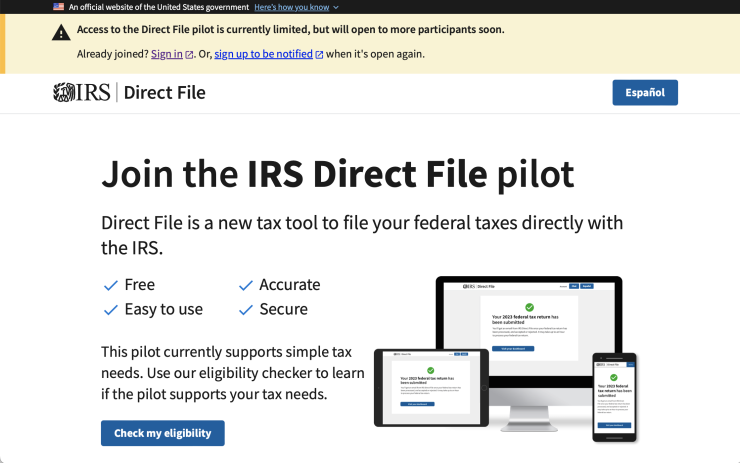The Internal Revenue Service declined to commit to expanding its Direct File free tax preparation program nationwide in response to a report from the Government Accountability Office, as the program comes under threat from Republican lawmakers who want to shut it down.
The
However, the program has attracted the opposition of Republican lawmakers and the commercial tax prep software industry. Last week, a group of 29 GOP members of Congress sent a
IRS commissioner Danny Werfel has been a major proponent of the Direct File effort, but Trump has already named a
The GAO report found the IRS is already behind schedule with recruiting and training customer service agents to help taxpayers use it in the 24 states where Direct File is slated to be available next tax season, due in part to insufficient coordination among various IRS offices.
The IRS limits participation in the Direct File program to taxpayers who live in certain states, facilitating coordination between federal and state tax filing. However, the GAO found the IRS could face challenges in reaching agreements with all 50 states, raising equity concerns for taxpayers who are unable to access Direct File due to where they live.
Last tax season, during pilot testing, the IRS accepted 140,803 Direct File returns in the 12 states where it was available, helping taxpayers with lower incomes fulfill their tax filing obligations. Taxpayers reported that Direct File was an easier tax preparation method than they had previously used, according to the report, and that factor contributed to the IRS's decision to make Direct File a "permanent" option.
The IRS is planning to expand the scope of taxpayers who can use Direct File in 2025 by adding support for the premium tax credit for health insurance coverage under the Affordable Care Act, along with other tax provisions, and by allowing residents of the additional 12 states to use the federal Direct File system.
The report also looked at the online tax filing systems used by some foreign tax authorities, including Australia, Belgium, Estonia, France, Ireland and New Zealand, as well as the U.S. territory of Puerto Rico, and found they prepopulate their taxpayers' tax returns with information already on file, such as wages reported by employers. The IRS started offering limited prepopulation in April 2024 during the pilot phase of testing Direct File. IRS officials told the GAO they are considering additional prepopulation of taxpayer data but are still in the early stages of planning. Identifying additional data for prepopulation in Direct File and developing a plan for testing its accuracy could enable the IRS to reduce taxpayer burden, the GAO noted.
The GAO made four recommendations in the report to the IRS, including improving coordination among relevant offices to ensure the recruitment of customer support employees, opening Direct File to all eligible taxpayers in the future, and identifying additional data that could be prepopulated in Direct File and testing its accuracy.
The IRS agreed with three of the GAO's recommendations, but neither agreed nor disagreed with its recommendation to continue coordinating with state revenue agencies to expand access to Direct File and, as necessary, take steps to ensure the availability of the federal Direct File program to eligible taxpayers in all 50 states.
"We acknowledge GAO's interest in seeing Direct File offered nationwide with expanded eligibility for taxpayers with more complex tax situations, and your recognition of the challenges we continue to explore in the expansion of Direct File," wrote IRS deputy commissioner Douglas O'Donnell in response to the report. "The complex and nuanced nature of our nation's tax laws require careful thought and consideration before support for any additional tax provisions can be added to Direct File to ensure nothing compromises its accuracy or usability for taxpayers."






